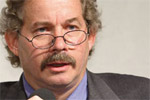Mongabay.com is partnering with the Skoll Foundation ahead of the Skoll World Forum on Social Entrepreneurship to bring a series of perspectives that aim to answer the question: how do we feed the world and still address the drivers of deforestation?
|
HOW DO WE FEED THE WORLD AND STILL ADDRESS THE DRIVERS OF DEFORESTATION? Soy, cattle, rice, palm oil, and logging are the principal drivers of deforestation. As global population increases from 7 billion to 9 billion by 2040, and as more and more people around the world rise out of poverty into the middle class, the demand for these commodities and practices will continue to rise with them. To address these issues, and in advance of the World Forests Summit hosted by the Economist in March, the Skoll World Forum on Social Entrepreneurship partnered with the Stanford Institute for the Environment and Mongabay News to surface the latest insights and innovations at the intersection of deforestation and sustainability. This debate will also set the stage for a larger discussion on deforestation at this year’s Skoll World Forum in Oxford, UK. |
There’s a new kind of environmental hero emerging. They don’t live in Washington, D.C., and they’re known more for their interest in increasing earnings than in reducing greenhouse gases. They are found in an unlikely place: The Corporate Boardroom, and they’re making a big difference in saving the worlds forests and our climate.
In recent years, a group of visionary corporate leaders have been quietly teaming up with a growing number of environmental groups to take a hard look at what’s left of our planet’s natural resources. Together, they agree: we are past the point where our land and oceans can meet the food, energy and commodity demands of our planet’s seven billion inhabitants. More sobering still, they estimate that by 2050, at our current rates of consumption, it will require three planet earths to meet the needs of our expected population of nine billion people. The take-away message for businesses that rely on finite resources such as water and forests is that “sustainability” is no longer a matter of choice, but a matter of economic survival.

|
Deforestation causes significant resource depletion. We are losing tropical forests to logging, plantation agriculture, cattle ranching and mining at the alarming rate of an acre per second. Every year, we lose forestlands equivalent in size to the State of New York. Furthermore, bulldozed and burning forests now represent almost two billion tons of carbon emissions annually, or about 15% of all global emissions – creating more air pollution than all the vehicles of the world combined. Until recently, it seemed that the practice of deforestation would continue unabated, as companies strive to mine the raw materials they need to keep pace with the ever-increasing demand for consumer goods. Enter the unlikely corporate heroes.
Recently, a global association of 400+ leading retail and manufacturing companies, called the Consumer Goods Forum (CGF), committed to insuring that their agricultural-based, product supply lines would become sustainable and deforestation-free by the year 2020. A CEO-driven organization, the CGF includes international corporations such as Unilever, Wal-Mart, Coca-Cola, Proctor & Gamble, General Mills, Cargill, Tesco, and others. Together, the CGF members have combined revenues of over $3 trillion, representing between 4-5% of global GDP. The CGF’s pledge represents a significant change in the purchasing practices of this group, and will have a profound and unprecedented effect on redirecting market forces toward sustainable agricultural practices and ending deforestation.
 AUTHOR: JEFFREY HOROWITZ FOUNDER, AVOIDED DEFORESTATION PARTNERS Jeff Horowitz is the founder of Avoided Deforestation Partners, an international network dedicated to advancing U.S. and international climate and energy policies along with business solutions that include robust incentives to protect tropical forests. Since its inception in 2007, AD Partners has convened public and private sector leaders to inspire decision makers to implement strategies that reduce deforestation. Most recently, AD Partners facilitated a partnership between the U.S. Government and the Consumer Goods Forum (CGF), a network of 400 CEOs representing US $3.1 trillion in commodities. The CGF has committed to removing deforestation from their supply chain by the year 2020, thereby creating an incentive to accelerate demand for sustainably produced agricultural commodities that are deforestation-free. The AD Partners Rio+20 high-level event served as the platform for the announcement. AD Partners continues to play a leadership role in establishing public-private partnerships between governments, NGOs and major international corporations. |
Clearly, not all vendor practices along the consumer goods commodity supply chain will transform overnight. However, according to assessments made by conservation experts (principally Jason Clay of WWF), if 100 key companies around the world can attain the goal of sustainably sourcing all of their raw materials, we would save 25% of our planet’s natural resources. Eventually, as other companies follow their lead, the percentage of resources saved could rise to 40% or higher. Much still needs to be done in the form of setting guidelines and tracking accountability, but this re-direction in the buying practices of major corporations and their suppliers could well represent one of the most significant environmental solutions of our lifetime.
While the impact of pro-environmental sourcing practices of the CFG member corporations and other enlightened companies are sure to have a profound impact on the fight to end global deforestation, the private sector cannot go it alone. Strong global partnerships between businesses, governments and civil societies will need to be forged to truly reflect the interests of all, and to ensure that these important coalitions can act together for the common good.
The U.S. Government and the CGF recently entered into such a partnership. The Tropical Forest Alliance 2020 was born shortly after the Rio+20 Conference in June of 2012. While still in the development stages, this new alliance is intended to help businesses and government more effectively coordinate their efforts to end global deforestation. Among other goals, the Alliance, which also includes the NGO community, intends to establish objective systems for measuring forest health, sharing best practices, and incentivizing forested countries for their conservation efforts. While just emerging, this partnership has the potential to be a model for the rest of the world and an important opportunity to implement and accelerate the move by corporate leaders. Time is not on our side!
While the world waits for U.S. lawmakers, China and the United Nations to once again take up the issue of climate pollution, businesses are indeed stepping up as environmental champions. Though they may be motivated more by their bottom line rather than by purely altruistic impulses, it’s nice to know that efforts to save the world’s forests and our climate are inspiring new and influential champions.
To discuss this commentary, please visit THE CORPORATE CONSERVATION REVOLUTION
|
ALL POSTS IN THIS SERIES
Can we meet rising food demand and save forests? (04/03/2013) A few weeks ago the Skoll World Forum hosted an online debate on how increased global consumption can be balanced with sustainability. The debate asks how a rapidly growing world that is ever consuming can hope to feed everyone, and at the same time address the deforestation that is emitting massive amounts of carbon into the atmosphere and destroying the world’s greatest tropical forests. Many contributors made very strong points—even contradicting one another in their approaches and ideas. Strong ‘no deforestation’ commitments save forests and feed people (03/12/2013) As a global community, we have so far failed to answer this most pressing question; we have yet to build our cloud. Deforestation rates are down in some places, but overall, our forests continue to disappear much as they have for the past 50 years, driven principally by increasing global demand for food. Can we feed the world and save our forests? Yes, we can, and the solution lies in the global supply chain and the message some companies are now sending their suppliers: ‘If you cut down trees, I won’t buy your product.’ This has the power to silence bulldozers. It’s already doing so and now it’s time to go to scale. The need to jump-start REDD to save forests (03/08/2013) At least US$7.3 billion has been pledged for REDD+ over the period from 2008 to 2015, with $4.3 billion pledged for REDD+ readiness during the fast-start period alone (2010-2012). In addition to these funds, private investors, private foundations, and others have been channeling financial support to developing countries for REDD+ and related programs for several years now. A promising initiative to address deforestation in Brazil at the local level (03/05/2013) The history of the Brazilian Amazon has long been marked by deforestation and degradation. Until recently the situation has been considered out of control. Then, in 2004, the Brazilian government launched an ambitious program to combat deforestation. Public pressure—both national and international—was one of the reasons that motivated the government to act. Another reason was that in 2004, deforestation contributed to more than 55 percent of Brazil’s total greenhouse gas emissions, making Brazil the fourth-largest greenhouse gas emitter in the world. Saving forests by putting a price on them (03/04/2013) During the 2013 SuperBowl, the championship game of the US National Football League, a truck company aired an advertisement that likened farmers to God’s favorite assistant. It suggested that when God needs something tough, or gentle, done, he calls a farmer. The narration, taken from a speech given to the Future Farmers of America in 1978 by Paul Harvey, a radio host, plays directly to the near mythical stature of farmers and ranchers in American culture and their deep connection to nature. Saving forests by stemming agricultural sprawl (03/01/2013) I’m fortunate to travel the world helping conserve habitats for some of the world’s most iconic species. When I visit places like the Amazon and Sumatra, I’m still awestruck by their diversity and pristine beauty. I’m also reminded how threatened they are. Our growing demand for food and fiber is fueling deforestation in resource-rich regions of the world. As environmentalists, if we don’t change where and how we produce food and fiber, we can turn off the lights and go home. There won’t be any biodiversity left to protect. Can saving forests help feed the world? (02/28/2013) As world population climbs from 7 to a projected 9 billion people and emerging and developing economies demand ever more of the food and fiber that drive deforestation, many environmentalists ask with increasing urgency whether and how tropical forests can survive. But the question may actually be whether and how the world’s increasing, and increasingly rich, population can be fed unless tropical forests survive. The challenge of putting Brazil’s forests in good hands (02/28/2013) People often associate Brazil with its forests. It’s no wonder given that nearly 60% of the country’s territory is covered by forest and it holds about one-third of the world’s remaining tropical rainforests. You might assume that a country like this would care about educating people to sustainably manage this precious heritage. Well, you’d be wrong! The corporate conservation revolution (02/27/2013) There’s a new kind of environmental hero emerging. They don’t live in Washington, D.C., and they’re known more for their interest in increasing earnings than in reducing greenhouse gases. They are found in an unlikely place: The Corporate Boardroom, and they’re making a big difference in saving the worlds forests and our climate. In recent years, a group of visionary corporate leaders have been quietly teaming up with a growing number of environmental groups to take a hard look at what’s left of our planet’s natural resources. Together, they agree: we are past the point where our land and oceans can meet the food, energy and commodity demands of our planet’s seven billion inhabitants. |
Editor’s note: The opinions expressed in this op-ed do not necessarily reflect the views of Mongabay.com or its staff. Mongabay founder, president, and editor Rhett A. Butler served as an advisor to the Skoll Foundation from 2010-2012.
Related articles








